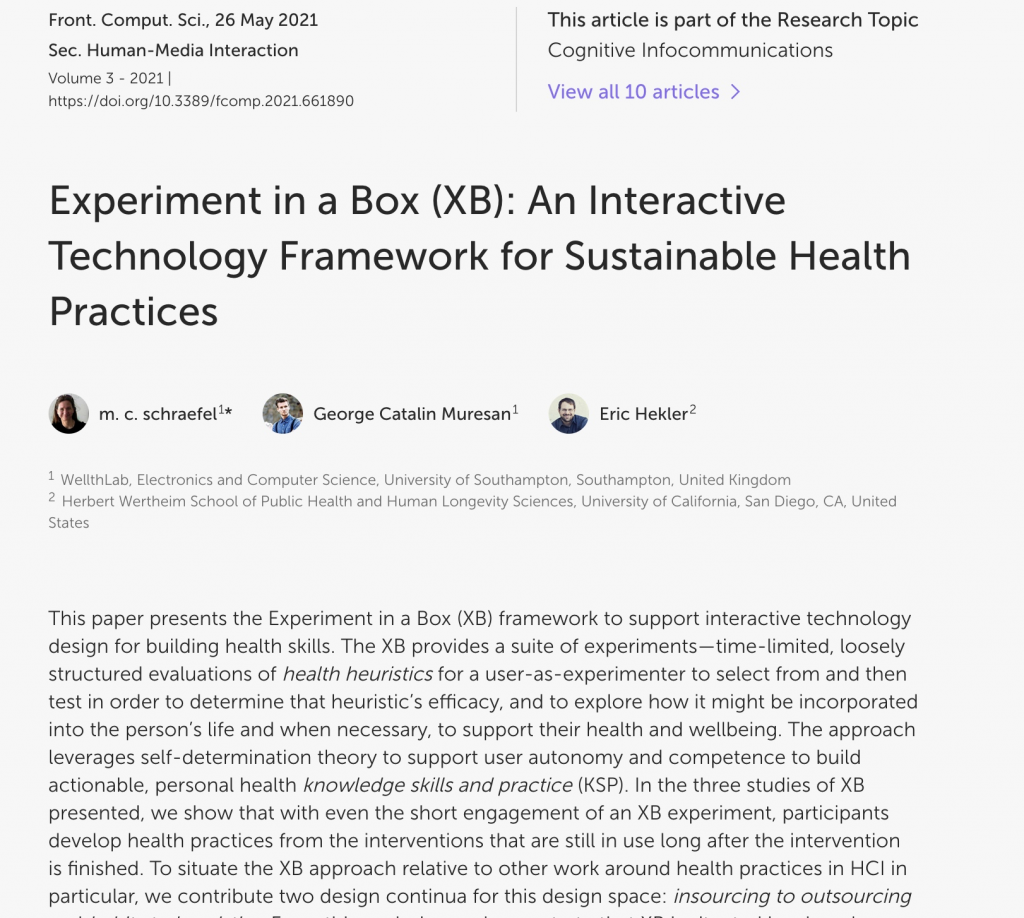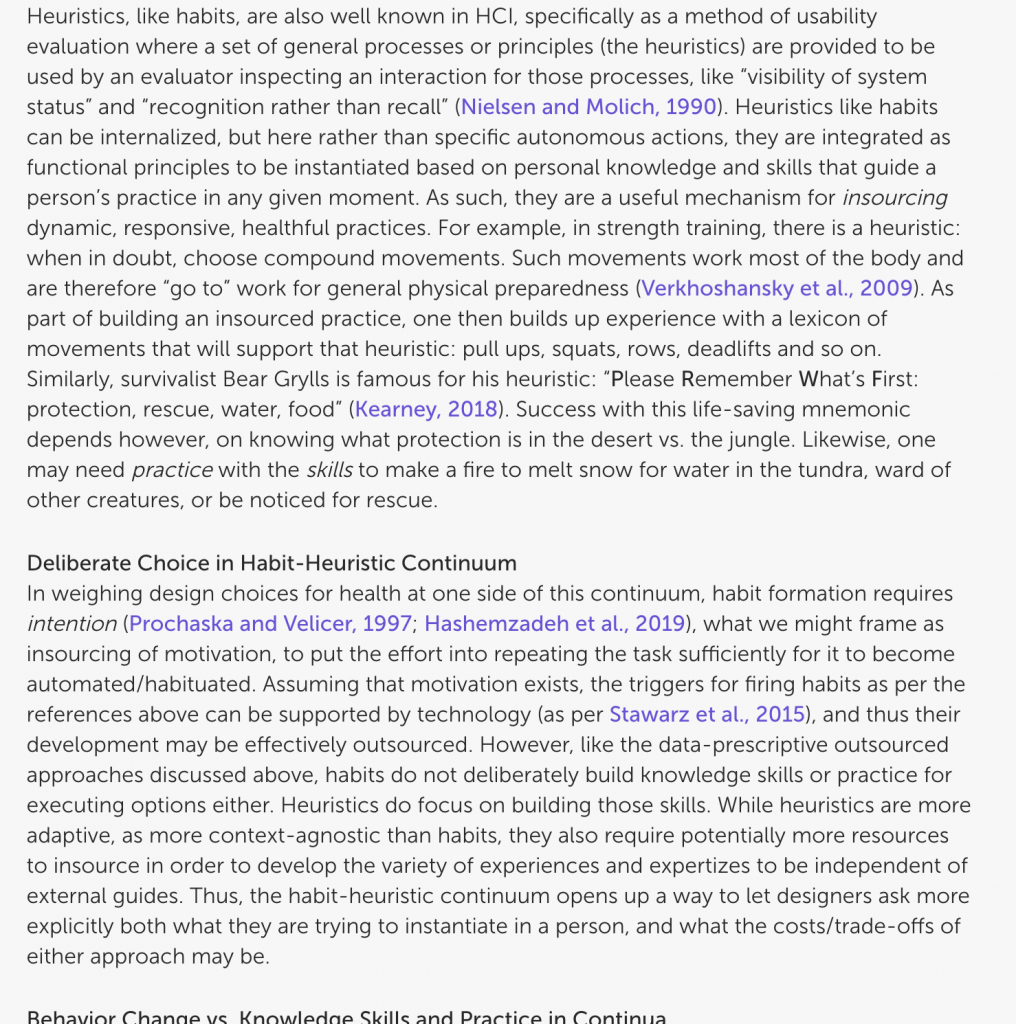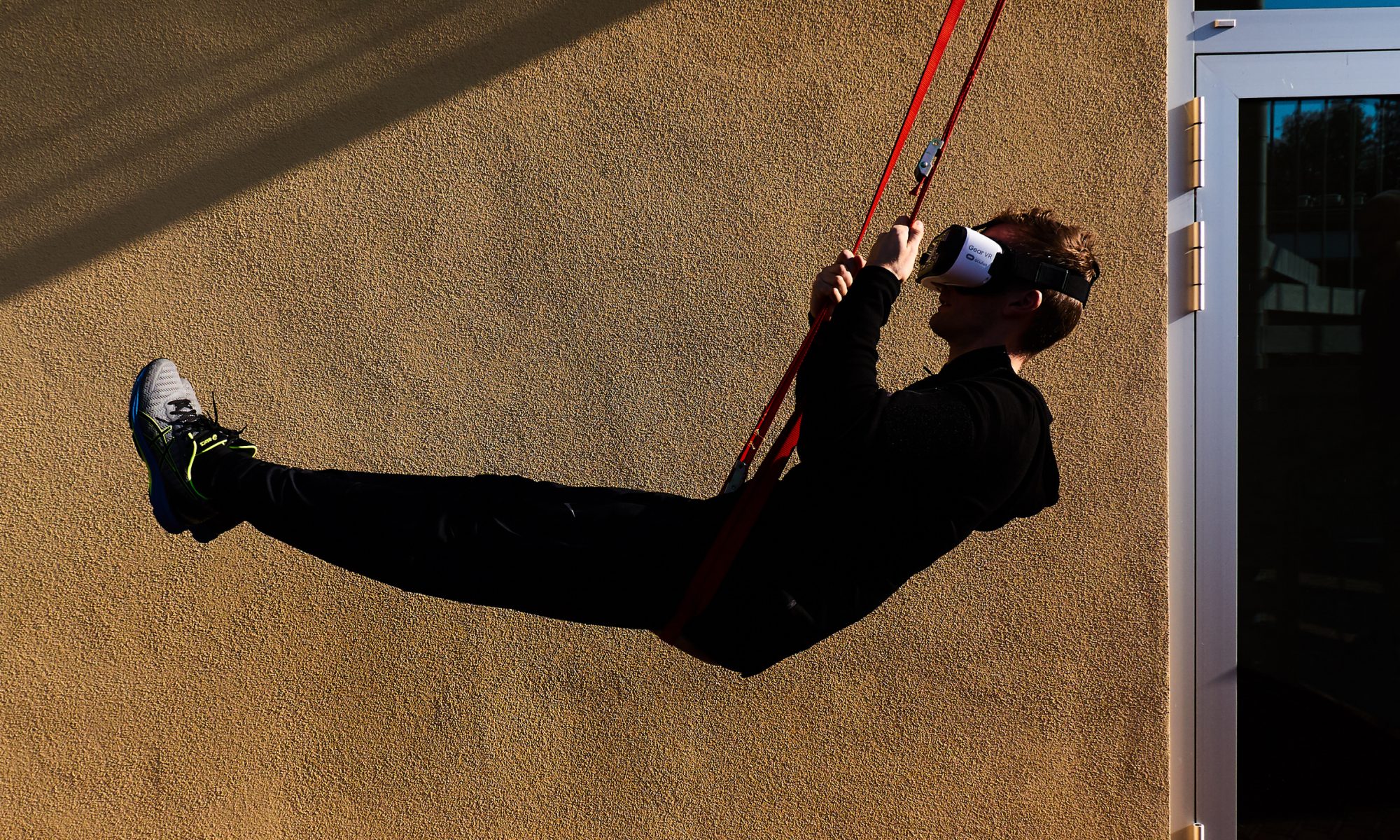m.c. schraefel – july 31, 2024
Welcome to the WellthLab – our mission to help #makeNormalBetter. Today we’re going to look at concepts in health coaching, education, related to help make it easier for us to do the thing – the health thing. These concepts are hack, habit and our fave, heuristic.
In health work from coaching to therapy, two words show up a lot:
hack and habit. One word that shows up less frequently in these contexts is “heuristic.” In this wee piece, i’d like to offer a reason to bring the concept of heuristic into you life – in particular, around your health practices.
Before making the case for heuristics, let’s get on the same page about hacks and habits.
HACKS
In the health space, most hacks are proposed as life hacks: short cuts to get you results you’d like with as little effort and new skill as possible. They are as undemanding as just take this supplement, plug in this device, listen to this tone, drink this coffee.
Sometimes hacks are completely effective, particularly as one-offs and emergencies. For example, a pipe starts to leak; no plumber in sight. Whatcha gonna do? Duct tape of course! it’s the ultimate hack tool. It can support a multitude of hack situations. But hacks are not meant as permanent solutions. They may become longer term for whatever exigency from can’t afford the replacement parts to can’t be bothered. No judgement – it’s just a fact: a hack is temporary and usually at risk of failing when hits the limits of its capacity, not the limits of the system’s capacity when it’s working.
When Hacks go bad: hacks becoming habits.
Hacks can become habituated for example.
In an emergency situation when one needs to be alert, wake up, hitting a big dose of caffeine can work wonders.
If using caffeine to keep one alert all the time, that hack fails; other things – not necessarily good – start to accrue.

If we need to stay alert at a weird time more regulalry, we need a more durable healthful practice.
HABITS
Habits themselves are practices we build up that are not skill-less and that at one point took deliberate energy to create.
Imagine brushing your teeth at night. Those reps may have been built up since childhood.
We had to learn that technique. A hygienist may still be trying to develop our technique. but now the practice and the doing of it are pretty established
Indeed, we build up habits as a colleague put it “so we don’t have to think about it – who wants to consciously think about brushing their teeth?” It’s a kind of set it and forget it.

Habits are also context sensitive. They are in that sense what’s called “brittle” What happens if the context breaks? What if you don’t have a toothbrush – forgot to pack one. How do you clean your teeth? Get the moogy out of your mouth?
Which brings us to Heuristics.
Heuristics
Heuristics are “rules of thumb,”” or templates. In a health context, in our research, we propose health heuristics as templates for a skillful healthful interaction [REF].
Let’s look at a general example. Consider Bear Grylls. Survivalist. He has a few heuristics for survival like Protein Shelter Water. Fantastic. Get these three things possibly in that order and you’re good (apparently).
The Heuristic sets you up for any context. What you need to know is how to instantiate that template in that context. Let’s take Grylls’s Protein.

TO enact this part of the survival heuristic, you need to know what a protein is within your current context. A protein in a jungle will be different from a protein in a desert, in the tundra, in Seattle.

Where a habit means learn whatever the skill is, associate it with that specific context to trigger it like “brush your teeth” (skill) “before bed” (trigger context) – you get that material set up to be able to fire that habit – like a tooth brush and tooth paste by the sink – and you execute it. Pretty effortlessly.
With a heuristic the template is pretty constant, but we’re always adding nuances to that heuristic in order to be as adaptable as possible. With as little stress as possible. Heuristics – well practiced, multiply instantiated heuristics – let us relax. Let’s take some sleep heuristics as an example.
If a sleep heuristic is a quiet dark space works for better sleep, anyone who travels will have a lot of different ways to instantiated that challenge. It may mean traveling with an eye mask and ear plugs. A clothes peg in a gear bag to keep hotel drapes shut is a lightweight bonus. No mask ? wash cloth over eyes, secured by a Buff or fresh underware. groovy. done.
You can see that health heuristics are based on principles of health need. Like needing protein. Given that, we can do advance work where possible to learn (build knowledge) about types of protein available in that context. We may check the skills we have to deal with that source, and maybe practice a little before being in that context. The degree to which we can adapt to a context, without freaking out, is the degree to which we can thrive in that context. This benefit of Heuristics and being able to relax, function better in different constexts, relates to the concept of allostasis – another post on that one.
BUILDING YOUR KSP – knowledge skills and practice – to instantiate your heuristic.
Here’s another example of where a health heuristic can come into play in terms of context. Say you’re avoiding starchy carbs like buns, bread, pasta, potatoes and you’re at a restaurant and the menu seems to have only those things. How do you get the protein and greens you want without taking on the carbs? The knowledge is that most restaurants if asked will fix something for you or offer an alternative. The skill is asking the server. That may be something where right now a person may get anxious and feel this isn’t ok. So how get practice? Practice is about making a skill safe to explore – just like in a sports skill, we build up our abilities progressively. How might you practice asking a server about options – if that is what is uncomfortable for you?
For folks who travel, figuring out how to eat on the road is a biggie – looking ahead to what’s going to be available where you are; what you can get close by or what travel with as back up is great. Indeed, it’s also something that can be practiced – forage like you’re at a hotel – before you go, too.
Review: Hack Habit Heuristic – which tool when?
Health heuristics will help us thrive in different contexts – and that’s the main difference here around heuristics from hacks and habits:
Like a hack, heuristics can help address a contextual need – like get darkness to get better sleep when on the road with unpredictable room illumination: how use what’s available – like a face cloth – or room service napkin.
Unlike hacks, heuristics are designed to be effective over the long term
Like a habit, heuristics take time to build up some skills to be able to perform a practice.
and unlike habits, they are specifically context-neutral so resilient rather than brittle.
Each of these hacks habits and heuristics are tools that open up our practice space to be more resilient over time – like a life time.
Hacks are great – they let you macgyver something for a quick fix. A one off.
Habits are great to get us to do what needs doing without having to add cognitive load/effort to figure out how to execute it; once the initial skill work has been put in, executing it is just reflexive.
Heuristics – at least our work around health heuristics – are principles based – or science-backed. The goal of the heuristic is also to help make what’s necessary to do accessible, testable so that you can see for yourself how well it works, for your contexts.
HEURISTICS are about principled and science backed support so they can be reliable across contexts, be adaptable, and therefore help you build RESILIENCE – the abilty to adapt, adjust, bounce back, across contexts.
Heuristics also offer a pathway to build more knowledge. If the heuristic is PROTEIN FIRST, we have the opportunity to ask “why” – and start exploring that pathway. In a habit, like “brush your teeth” – there’s a question about mechanism that’s possible – like ok why brush? That’s a relatively new technology and we’ve been around much longer and skulls that are pretty old have teeth…” – That’s a good question too. Questions about health heuristics – at least in our research in them – tend to get away from mechanism – as that’s an instantiation – and to principles like: get protein. How you do that is up to your KSP and how resilient that is for your context.
In the macgyver video linked above, there’s a one off hack; that hack would not have been possible without deep knowledge about the materials involved and available. We’ve also seen this of course with Cpt Kirk and the Gorn – even though the “science” here has been busted.
Again a biggie difference with heuristics from hacks is that a hack is a potentially extremely clever one off to solve an immediate problem. It is the band aid to get one to better help; the bandaid is not the solution. Short term wins. If they become long term, things fall apart – a problem waiting to happen, and maybe more costly to address later. No judgements; just saying..
Habits are enduring. That’s there whole thing – whether they’re health positive or negative, habits get to that reflexive point where they are context triggered. Even if that context is something going on inside of us. Habits are therefore not particularly adaptive – they’re not meant to be. Ya gotta brush your teeth. Morning and night – if that’s how you’re doing your dental care.
Heuristics can respond to a given context – like a hack – but we have them in our back pocket – like habits. The context triggers not the hack but the template. We build up our experience – our knowledge skills and practice of instantiation across contexts – and we can relax more – we’ve got this. We have the principles to to be adaptive to life’s rich contextually changing pageant.
Interested in the research we do around heuristics? here’s one of our papers.
Thanks for reading!


